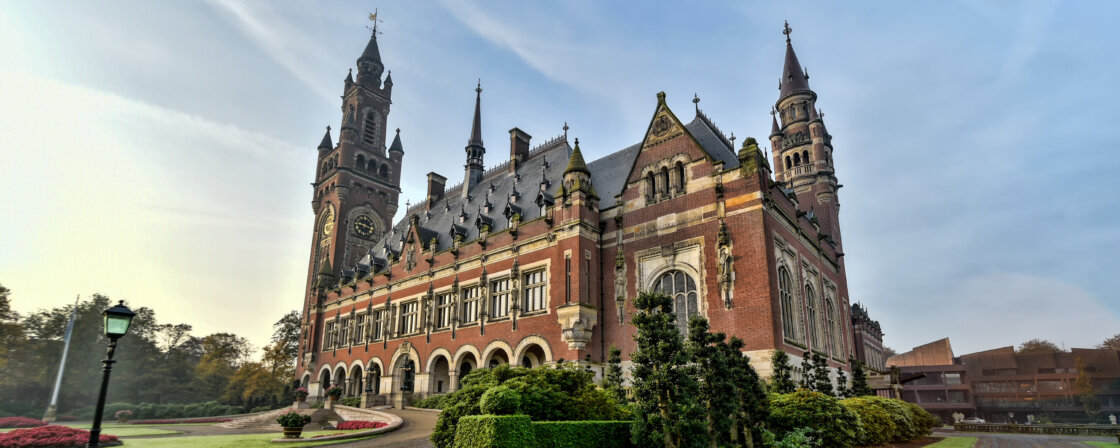What the International Court of Justice does
The International Court of Justice (ICJ for short) was established in 1945 as the principal judicial organ of the UnitedNations (UN). Its main task is to adjudicate disputes between states. The ICJ thus deals with disputes submitted to it by individual states, deciding primarily on the basis of their treaty obligations.
It is also responsible for the interpretation of international agreements, conventions and norms. The decisions of the ICJ are binding on all States involved and cannot be appealed. Last but not least, it provides advice at the request of the UN and other international organisations.
The ICJ thus plays a key role in mediating and resolving international disputes and is an important instrument for maintaining peace and stability in the world on the basis of the rules and principles of international law.
Are you solving a similar problem?
Need some advice?
Do you have a question about the International Court of Justice? Ask an Accessible Advocate. We will resolve everything online and on short notice.
I have a question
- When you order, you know what you will get and how much it will cost.
- We handle everything online or in person at one of our 6 offices.
- We handle 8 out of 10 requests within 2 working days.
- We have specialists for every field of law.
History
The International Court of Justice has a long history, dating back to the inter-war period. Its predecessor was the Permanent Court of International Justice , established in 1922 by the League of Nations (the predecessor of today’s United Nations). It was based in The Hague and adjudicated disputes between member states and organisations. Its de facto activities ceased as a result of the Second World War.
After World War II, it was replaced by the International Court of Justice under the provisions of the UN Charter, which came into force in 1945. This made it the highest judicial organ of the UN, responsible for settling disputes between states and providing legal advice at the request of various international organizations, and it continues to function as such to this day.
Tip for article
Tip: You can also read about how the law of another major international organisation – the European Union– works.
Judges of the International Court of Justice
Judges of the International Court of Justice are elected to ensure diversity and representation of different legal traditions and cultural backgrounds. It is therefore important that, for example, Anglo-Saxon law, which relies heavily on judicial precedents, continental law, which we have here, or Islamic Sharia law are represented.
The Court consists of 15 judges who are elected by the UN General Assembly and the UN Security Council. Each judge serves a nine-year term and their terms are staggered so that five judges rotate every three years.
Only a person of presumed moral character can become a judge. They must also be qualified to hold the highest judicial positions within their country (e.g., the Constitutional Court) or be an attorney with experience in international law. Judges of the International Court of Justice must be independent of their state and therefore cannot act in its favour.
Tip for article
Tip: Learn how to become a judge in the Czech Republic. What conditions you have to meet, how the appointment process works and how much you earn.
Given the total number of judges, it is not possible to elect one judge for each state, but care is taken to ensure that there is as much diversity as possible. The rule is that no two judges may be elected from the same state. It is also an unwritten rule that five judges are elected from Western countries (i.e. the USA, Western Europe or Australia), three from African countries, two from Eastern Europe, three from Asia and two from Latin America and the Caribbean. At present, the judges of the International Court of Justice include judges from Lebanon, Slovakia, China, Romania and Uganda. Traditionally, one judge from France, China, Russia, the United Kingdom and the United States has a place. The MSD has not yet had a judge from the Czech Republic.
The International Court of Justice usually sits as a whole group, but can also form chambers of three or five judges. These chambers can be formed on an ad hoc basis.
Decision-making processes
Decisions of the International Court of Justice can affect all UN member states. The ICJ decides disputes only between states, not between individuals or corporations. However, this does not mean that it cannot resolve individual problems. In this case, however, a state must bring a case on behalf of that individual. However, in order for the ICJ to adjudicate, it needs the consent of both states (most often this consent is provided in various international treaties). Pending a judgment, the ICJ may order interim measures to protect the rights of either state.
In addition to resolving disputes, the ICJ also has an advisory function. However, this serves only certain UN organs. Although its opinions do not have legal effect, they are widely respected and adhered to principles.
One of the most famous disputes decided by the International Court of Justice (ICJ) was the 1980 dispute between the United States of America and Iran. This dispute consisted of Iranian revolutionaries taking control of the U.S. embassy in Tehran to express support for the revolution. Along with this, they took more than 60 American diplomats and citizens hostage.
In this case, the ICJ ruled that Iran had violated international law by failing to protect the US embassy and ensure their integrity and security. The ICJ judgment recognized the right of the US to compensation for the harm caused by this violation of international law.
International Criminal Court
Often confused with the International Court of Justice is the International Criminal Court (ICC), which is also based in The Hague, Netherlands. However, unlike the ICJ, it is not under the UN and does not focus on disputes between states, but on individuals and their international crimes. Specifically, it deals with four groups of international crimes:
- Genocide: genocide consists of the deliberate and systematic attempt to exterminate part or all of a national, ethnic, racial or religious group.
- Crimes against humanity: Crimes against humanity are serious acts committed as part of a widespread or systematic attack on a civilian population, often in the context of war. This includes, for example, enslavement, torture, forcible transfer of populations, murder or sexual violence.
- War crimes: War crimes are violations of the rules and customs of the law of war, which are codified in international treaties such as the Geneva Conventions. These crimes can take place in both international and domestic conflicts. They include, for example, the killing of civilians, violence against prisoners or the use of prohibited weapons.
- Crime of aggression: the crime of aggression is defined as planning, preparing, initiating or waging an offensive war that is contrary to international law. It is therefore any attack on a sovereign state without a UN mandate.
The International Criminal Court is headed by a Bureau, consisting of a President and two Vice-Presidents, who are elected from among the judges for three-year terms. The Bureau oversees the administration and represents the Court at the international level. The Court is made up of a total of 18 judges who work in three divisions. It also includes the Office of the Prosecutor, which is an independent body responsible for investigating and prosecuting crimes within the ICC’s jurisdiction.
Summary
The International Court of Justice is the principal judicial organ of the United Nations, based in The Hague. It adjudicates disputes between states under international law and provides legal advice to UN bodies. It consists of 15 judges elected for nine-year terms, representing different legal and cultural backgrounds. It is often confused with the International Criminal Court. However, the latter is not part of the UN and adjudicates international crimes committed by individuals.




